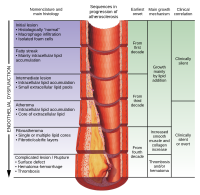
Photo from wikipedia
Purpose Diabetes is a chronic inflammatory disorder resulting in endothelial dysfunction which contributes to peripheral arterial disease and limb ischemia. Leukocytes play critical roles in vascular and tissue remodelling after… Click to show full abstract
Purpose Diabetes is a chronic inflammatory disorder resulting in endothelial dysfunction which contributes to peripheral arterial disease and limb ischemia. Leukocytes play critical roles in vascular and tissue remodelling after ischemia. This study investigated the effects of dietary glutamine (GLN) supplementation on immune cell polarization in diabetic mice subjected to limb ischemia. Methods Diabetes was induced by an intraperitoneal injection of streptozotocin for 5 consecutive days in C57BL/6J mice. Diabetic mice were fed the AIN-93 diet or an AIN-93 diet in which a part of the casein was replaced by GLN. After 3 weeks of the dietary intervention, mice were subjected to unilateral femoral artery ligation to induce limb ischemia. Results GLN supplementation enhanced the proportion of anti-inflammatory monocytes and regulatory T cells in the blood. Expression of C-C motif chemokine receptor 5 by activated CD4 + T cells was promoted and prolonged in the GLN-supplemented group. GLN downregulated the percentage of M1 macrophages in muscle tissues which was correlated with lower levels of C-C motif chemokine ligand 2 in plasma. The muscle M1/M2 ratio was also reduced in the GLN group. Gene expression of interleukin-6 was suppressed by GLN supplementation, while expression levels of the peroxisome proliferator-activated receptor γ and myogenic differentiation 1 genes were elevated in post-ischemic muscles. Histological findings also indicated that muscle regeneration was accelerated in the GLN group. Conclusions GLN supplementation in diabetic mice may exert more-balanced polarization of CD4 + T cells, monocytes, and macrophages, thus attenuating inflammatory responses and contributing to muscle regeneration after limb ischemia.
Journal Title: European Journal of Nutrition
Year Published: 2019
Link to full text (if available)
Share on Social Media: Sign Up to like & get
recommendations!